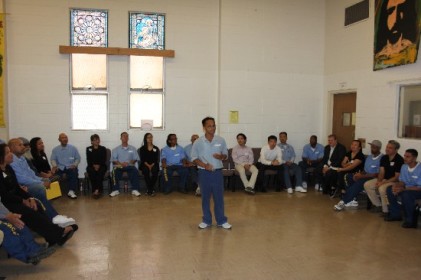
APSC hosted the national convening, AAPIs Behind Bars: Exposing the School to Prison to Deportation Pipeline on June 26th, 2015 at San Quentin State Prison.
Greetings from APSC! We hope you and your loved ones are doing well. It has been too long since we last shared what we have been up to, so here goes with a year-end summary:
APSC’s ROOTS program at San Quentin State Prison completed its second cycle, graduating a cohort of 39 participants. Inspired from Ethnic Studies/Asian American Studies curriculum, the ROOTS program included presentations and discussions on the following topics: Asian American and Pacific Islander (AAPI) immigration history, intergenerational trauma, social justice movements, racial formation and criminalization, health disparities, mental health, cultural healing practices, masculinity and gender, healthy/unhealthy relationships, LGBTQ experiences, deportation policies, reentry planning, and comedy. Thank you to all of our inside and outside facilitators who led the weekly class. We are already underway with ROOTS cycle 3, with an enhanced curriculum led by Ethnic Studies professor Roger Chung and the continued involvement from many inside and outside facilitators!
APSC’s Roots 2 Reentry program continued providing peer support and case management services for recently released individuals. A total of 22 formerly incarcerated men and women have participated in the program. In addition to direct services, APSC provides “community immersion” opportunities, where formerly incarcerated people can participate in cultural events to build community and increase their social support networks. Some examples included painting a Lunar New Year’s mural, attending AAPI community events and rallies, volunteering for community-based groups, and holding group exercise activities. APSC continued its collaboration with Red Bay Coffee, a fast-growing local coffee roasting company. Red Bay provided paid employment training for several of our formerly incarcerated participants and hired three formerly incarcerated folks to their staff.
In June 2015, APSC and the ROOTS program hosted AAPIs Behind Bars: Exposing the School to Prison to Deportation Pipeline, a national convening at San Quentin State Prison that brought together more than 100 stakeholders from diverse sectors, including community-based and national organizations, labor unions, foundations, elected officials, currently and formerly incarcerated AAPIs, educators, and researchers. The ROOTS leaders gave presentations about intergenerational trauma, transformation, and social justice. The audience was moved by their personal stories, honesty, reflection, and vision.
We are also grateful to have built key alliances with many organizations and community leaders during the planning of the convening, including the AAPIs Beyond Bars national planning committee: 1Love Movement; Advancing Justice-LA; Asian Pacific American Labor Alliance, AFL-CIO; Empowering Pacific Islander Communities; National Education Association; and Southeast Asia Resource Action Center. Another key partnership involved Asian Health Services, which provided APSC with its first office space, housed at The Spot Youth Center in Oakland Chinatown.
In September 2015, Eddy Zheng, APSC Co-Chair, began a Soros Justice Fellowship. His 18-month project will seek to raise awareness about the impact of criminalization and deportation on the AAPI community and ensure that the AAPI voice and experience is included in the larger movement to end mass incarceration in the United States. We are excited to have Eddy working full-time with APSC as we continue to grow.
In December 2015, Eddy Zheng and Harrison Seuga (APSC Reentry Director) represented APSC at a congressional briefing in Washington D.C. focused on the School to Prison to Deportation Pipeline, organized by the AAPIs Beyond Bars committee. This event served as the release for a joint report on AAPIs and mass incarceration, which can be downloaded here: http://bit.ly/
While public attention to mass incarceration has grown and public policies begin to shift towards decreasing the prison population, many challenges remain: the inhumane conditions in immigration detention centers have led to hunger strikes and administrative retaliation; many state prison beds have simply been replaced by increasing county jail beds; Sheriff’s and Probation departments seek to control realignment/reentry funds, rather than investing in community-based solutions; and transformative policy shifts remain elusive.
For many years, APSC has operated on volunteer labor and a shoestring budget. As we look to expand (replicating ROOTS program at another prison, hiring another formerly incarcerated person, and playing a larger role in advocacy and organizing), we will need to increase our staff time and resources. If you are able to make a donation towards APSC’s programs, please visit: https://www.givedirect.
and select Asian Prisoner Support Committee from the drop-down Program Area.
Sincerely,
Ben, Eddy, Harrison, Kasi, Kori, and Roger
Asian Prisoner Support Committee
PO Box 1031
Oakland, CA 94604
apscinfo@gmail.com
twitter: AsianPrisonerSC
www.asianprisonersupport.com



